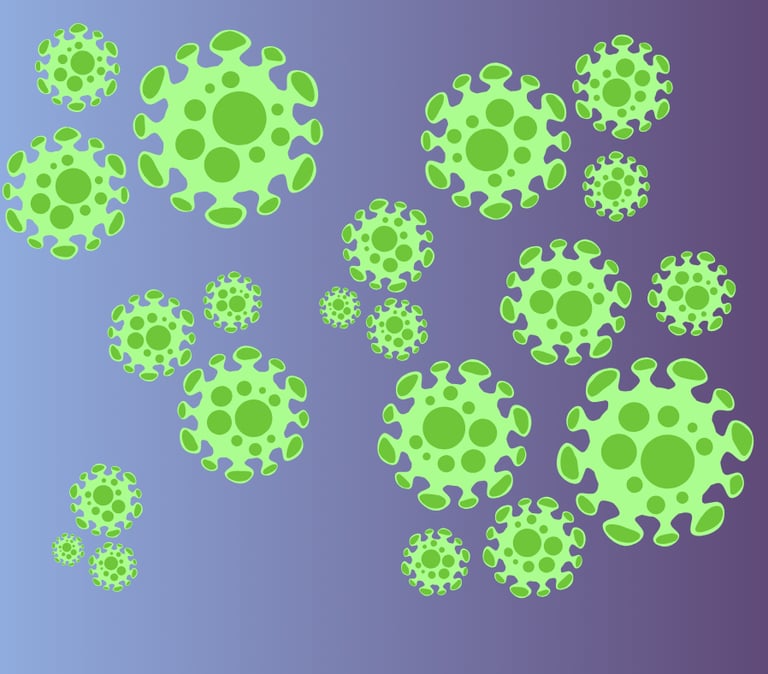Stay updated on what is trending in health. Discover tips and resources for a healthier, balanced life.
Epstein-Barr Virus (EBV): Causes, Symptoms, Treatment, and Prevention
Learn about Epstein-Barr Virus (EBV), its causes, symptoms, treatment, and prevention. Discover how EBV spreads, its connection to mono, and ways to protect your health.
DISEASES AND CONDITIONS
Dr. S. Ali
4/30/20253 min read


Epstein-Barr virus (EBV) is one of the most common viruses in the world, infecting millions of people every year. It belongs to the herpesvirus family and is best known for causing infectious mononucleosis, also called "mono" or the "kissing disease." While many EBV infections go unnoticed, the virus can sometimes lead to serious health complications. Understanding EBV, its symptoms, and how to protect yourself is essential for maintaining good health.
What is Epstein-Barr Virus (EBV)?
EBV is a widespread virus that primarily spreads through saliva but can also be transmitted through blood, organ transplants, and sexual contact. Once a person is infected, the virus remains in their body for life, lying dormant in the immune system. In some cases, EBV can reactivate, though this usually does not cause symptoms.
Causes and Transmission of EBV
EBV spreads easily through close personal contact, making it highly contagious. Common ways of transmission include:
Kissing – The virus is commonly passed through saliva, which is why mononucleosis is often called the "kissing disease."
Sharing drinks or utensils – Using the same glass, straw, or eating utensils as an infected person can spread the virus.
Coughing or sneezing – Respiratory droplets from an infected person can transmit EBV.
Blood and organ transplants – Less commonly, EBV can spread through transfusions or organ donations.
Symptoms of Epstein-Barr Virus Infection
Many people contract EBV in childhood and experience mild or no symptoms. However, in adolescents and adults, EBV can cause infectious mononucleosis, which has more noticeable effects. Symptoms usually appear four to six weeks after infection and can last for weeks.
Common Symptoms:
Extreme fatigue
Fever
Sore throat (often severe and lasting longer than a regular cold)
Swollen lymph nodes in the neck and armpits
Swollen liver or spleen (in some cases)
Skin rash (less common)
Potential Complications:
While most people recover without issues, some complications can arise, including:
Enlarged spleen (which, if ruptured, can cause serious internal bleeding)
Liver problems, including hepatitis
Neurological issues such as meningitis or Guillain-Barré syndrome (in rare cases)
Chronic EBV infection, which can lead to ongoing fatigue and immune dysfunction
Increased risk of certain cancers, such as Hodgkin’s lymphoma and nasopharyngeal cancer
Diagnosis of EBV
Doctors diagnose EBV through a combination of symptoms, physical examination, and blood tests. Common tests include:
Monospot test – A rapid test to detect heterophile antibodies, often used to diagnose mono.
EBV antibody tests – These detect different types of antibodies to confirm an EBV infection.
Complete blood count (CBC) – Helps check for an elevated white blood cell count, which can indicate an infection.
Treatment for EBV
There is no specific cure for EBV, as it is a viral infection. However, supportive care can help manage symptoms and promote recovery.
Self-Care and Home Remedies:
Get plenty of rest – Fatigue can last for weeks, so it’s important to allow your body time to recover.
Stay hydrated – Drink plenty of fluids to prevent dehydration, especially if you have a fever.
Relieve sore throat pain – Use lozenges, warm saltwater gargles, or over-the-counter pain relievers.
Use fever-reducing medications – They can help reduce fever and discomfort.
Medical Treatment:
Corticosteroids – In severe cases with significant swelling, doctors may prescribe steroids to reduce inflammation.
Hospitalization – Rarely, if complications occur, hospital care may be required.
Prevention Tips
Currently, there is no vaccine for EBV, but you can take steps to reduce your risk of infection:
Avoid sharing drinks, utensils, and toothbrushes with others.
Wash hands frequently, especially after coughing or sneezing.
Avoid kissing or close contact with someone who has mono.
Practice safe sex, as EBV can spread through bodily fluids.
Can Epstein-Barr Virus Cause Long-Term Health Issues?
For most people, EBV infections resolve without long-term problems. However, in some cases, the virus has been linked to chronic fatigue syndrome (CFS), autoimmune conditions, and even certain cancers. Scientists continue to research the potential long-term effects of EBV and its role in immune system disorders.
Final Thoughts
Epstein-Barr virus is incredibly common and usually harmless, but it can cause mononucleosis and lead to complications in some individuals. While there is no cure, proper rest, hydration, and symptom management can help you recover. By understanding how EBV spreads and taking preventive measures, you can reduce your risk and protect your health.
References:
Centers for Disease Control and Prevention (CDC): https://www.cdc.gov/epstein-barr/about/index.html
Cleveland Clinic: https://my.clevelandclinic.org/health/diseases/23469-epstein-barr-virus
Mayo Clinic: https://www.mayoclinic.org/diseases-conditions/mononucleosis/symptoms-causes/syc-20350328?utm_source=chatgpt.com
WebMD: https://www.webmd.com/a-to-z-guides/epstein-barr-virus?utm_source=chatgpt.com
Pulse Your Health
Empowering you to achieve your health goals.
Contact
© 2026. All rights reserved.
Disclaimer: The content on this website is for informational purposes only and is not medical advice. Always seek the advice of your physician or other suitably qualified healthcare professional for diagnosis, treatment and your health related needs.
